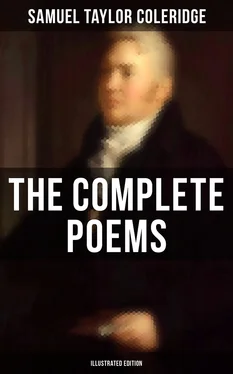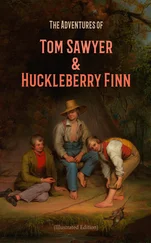"Inextricable disobedience" and
"To love or not: in this we stand or fall"—
yet both lines are composed of five iambics? The third, of the strength and position, the concentration or diffusion of the emphasis . Fourth, the length and position of the pauses. Then compare his narrative with the harangues. I have not noticed the ellipses, because they either do not affect the rhythm, or are not ellipses, but are comprehended in the feet.
APHORISMS OR PITHY SENTENCES
Shall I compare man to a clockwork Catamaran, destined to float on in a meaner element for so many moments or hours, and then to explode, scattering its involucrum and itself to ascend into its proper element?
I am persuaded that we love what is above us more than what is under us.
Money—paper money—peace, war. How comes it that all men in all companies are talking of the depreciation, etc. etc.—and yet that a discourse on transubstantiation would not be a more withering sirocco than the attempt to explain philosophically the true cure and causes of that which interests all so vehemently?
All convalescence is a resurrection, a palingenesy of our youth—"and loves the earth and all that live thereon with a new heart." But oh! the anguish to have the aching freshness of yearning and no answering object—only remembrances of faithless change—and unmerited alienation!
The sun at evening holds up her fingers of both hands before her face that mortals may have one steady gaze—her transparent crimson fingers as when a lovely woman looks at the fire through her slender palms.
O that perilous moment [for such there is] of a half-reconciliation, when the coldness and the resentment have been sustained too long. Each is drawing toward the other, but like glass in the mid-state between fusion and compaction a single sand will splinter it.
Sometimes when I earnestly look at a beautiful object or landscape, it seems as if I were on the brink of a fruition still denied—as if Vision were an appetite ; even as a man would feel who, having put forth all his muscular strength in an act of prosilience, is at the very moment held back —he leaps and yet moves not from his place.
Philosophy in general, but a plummet to so short a line that it can sound no deeper than the sounder's eyes can reach—and yet—in certain waters it may teach the exact depth and prevent a drowning.
The midnight wild beasts staring at the hunter's torch, or when the hunter sees the tiger's eye glaring on the red light of his own torch.
A summer-sailing on a still peninsulating river, and sweet as the delays of parting lovers.
Sir F[rancis] B[urdett], like a Lapland witch drowned in a storm of her own raising. Mr. Cobbett, who, for a dollar, can raise what, offer him ten thousand dollars, he could not allay.
August, 1811
Why do you make a book? Because my hands can extend but a few score inches from my body; because my poverty keeps those hands empty when my heart aches to empty them; because my life is short, and [by reason of] my infirmities; and because a book, if it extends but to one edition, will probably benefit three or four score on whom I could not otherwise have acted, and, should it live and deserve to live, will make ample compensation for all the aforestated infirmities. O, but think only of the thoughts, feelings, radical impulses that have been implanted in how many thousands by the little ballad of the "Children in the Wood"! The sphere of Alexander the Great's agency is trifling compared with it.
PRESENTIMENTS
One of the strangest and most painful peculiarities of my nature (unless others have the same, and, like me, hide it, from the same inexplicable feeling of causeless shame and sense of a sort of guilt, joined with the apprehension of being feared and shrunk from as a something transnatural) I will here record—and my motive, or, rather, impulse, to do this seems an effort to eloign and abalienate it from the dark adyt of my own being by a visual outness, and not the wish for others to see it. It consists in a sudden second sight of some hidden vice, past, present or to come, of the person or persons with whom I am about to form a close intimacy—which never deters me, but rather (as all these transnaturals) urges me on, just like the feeling of an eddy-torrent to a swimmer. I see it as a vision, feel it as a prophecy, not as one given me by any other being, but as an act of my own spirit, of the absolute noumenon , which, in so doing, seems to have offended against some law of its being, and to have acted the traitor by a commune with full consciousness independent of the tenure or inflected state of association, cause and effect, &c.
THE FIXED STARS OF TRUTH
As the most far-sighted eye, even aided by the most powerful telescope, will not make a fixed star appear larger than it does to an ordinary and unaided sight, even so there are heights of knowledge and truth sublime which all men in possession of the ordinary human understanding may comprehend as much and as well as the profoundest philosopher and the most learned theologian. Such are the truths relating to the logos and its oneness with the self-existent Deity, and of the humanity of Christ and its union with the logos . It is idle, therefore, to refrain from preaching on these subjects, provided only such preparations have been made as no man can be a Christian without. The misfortune is that the majority are Christians only in name, and by birth only. Let them but once, according to St. James, have looked down steadfastly into the law of liberty or freedom in their own souls (the will and the conscience), and they are capable of whatever God has chosen to reveal.
C'EST MAGNIFIQUE, MAIS CE N'EST PAS LA POÉSIE
A long line of (!!) marks of admiration would be its aptest symbol! It has given me the eye-ache with dazzlement, the brain-ache with wonderment, the stomach and all-ache with the shock and after-eddy of contradictory feelings. Splendour is there, splendour everywhere—distinct the figures as vivid—skill in construction of events—beauties numberless of form and thought. But there is not anywhere the "one low piping note more sweet than all"—there is not the divine vision of the poet, which gives the full fruition of sight without the effort—and where the feelings of the heart are struck, they are awakened only to complain of and recoil from the occasion. O! it is mournful to see and wonder at such a marvel of labour, erudition and talent concentered into such a burning-glass of factitious power, and yet to know that it is all in vain—like the Pyramids, it shows what can be done, and, like them, leaves in painful and almost scornful perplexity, why it was done, for what or whom.
SILENCE IS GOLDEN September 29th, 1812
Grand rule in case of quarrels between friends or lovers—never to say, hint, or do anything in a moment of anger or indignation or sense of ill-treatment, but to be passive—and even if the fit should recur the next morning, still to delay it—in short, however plausible the motive may be, yet if you have loved the persons concerned, not to say it till their love has returned toward you, and your feelings are the same as they were before. And for this plain reason—you knew this before, and yet because you were in kindness, you never felt an impulse to speak of it—then, surely, not now when you may perpetuate what would otherwise be fugitive.
THE DEVIL: A RECANTATION
"That not one of the peculiarities of Christianity, no one point in which, being clearly different from other religions or philosophies, it would have, at least, the possibility of being superior to all, is retained by the modern Unitarians." This remark is occasioned by my reflections on the fact that Christianity exclusively has asserted the positive being of evil or sin, "of sin the exceeding sinfulness"—and thence exclusively the freedom of the creature, as that, the clear intuition of which is, both, the result and the accompaniment of redemption. The nearest philosophy to Christianity is the Platonic, and it is observable that this is the mere antipodes of the Hartleio-Lockian held by the Unitarians; but the true honours of Christianity would be most easily manifested by a comparison even with that " nec pari nec secundo ," but yet " omnibus aliis propriore ," the Platonic! With what contempt, even in later years, have I not contemplated the doctrine of a devil! but now I see the intimate connection, if not as existent person , yet as essence and symbol with Christianity—and that so far from being identical with Manicheism, it is the surest antidote (that is, rightly understood).
Читать дальше












